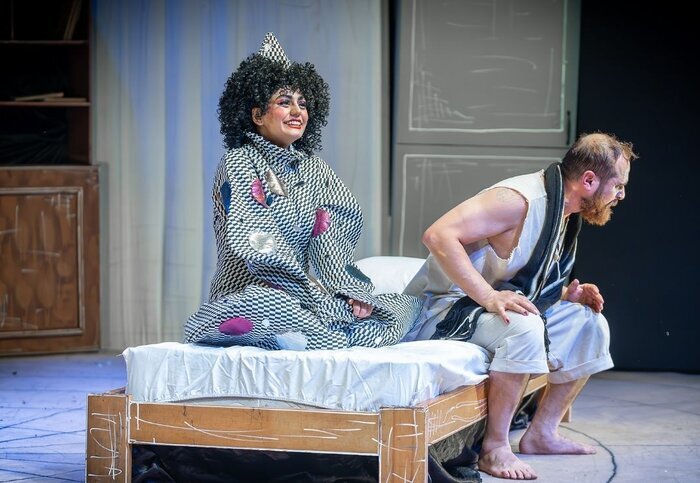Adaptation of “The Trial” on stage at Tehran theater

TEHRAN – An adaptation of Czech writer Franz Kafka’s novel “The Trial” is currently on stage at Tehran's Homa Theater Hall.
Written by Mohammad Charmshir and Farhad Mohandespour, Shahrouz Delafkar is the director of the play, which has been renamed “Joseph K”.
Behrouz Panahandeh, Pezhvak Imani, Raha Hajizeinal, Sahar Abdolmaleki, Ehsan Rezvani and Ehsan Rezvani are the main members of the cast for the play, which will remain on stage until July 30.
“The Trial” is a seminal novel written between 1914 and 1915, published posthumously in 1925. Considered one of Kafka’s most influential works, it explores themes of justice, guilt, and the absurdity of bureaucratic systems. The novel chronicles the mysterious and harrowing experience of Josef K., a bank clerk who one day finds himself unexpectedly arrested by an opaque authority for an unspecified crime. Throughout the story, Kafka delves into the existential anxiety of facing an incomprehensible legal system that remains largely inaccessible and unfathomable to both Josef and the reader. Notably, Kafka never completed the novel, but it includes a chapter that appears to serve as an abrupt, perhaps symbolic, conclusion.
Kafka’s "The Trial" was heavily influenced by Russian novelist Fyodor Dostoevsky, particularly "Crime and Punishment" and "The Brothers Karamazov". Kafka himself regarded Dostoevsky as a "blood relative," reflecting the shared intensity of their exploration of guilt, morality, and human suffering. Like Kafka’s other unfinished works, "The Castle" and "Amerika", the novel remains incomplete, with Kafka’s original manuscript consisting of loose pages that his friend and literary executor, Max Brod, compiled into the narrative we know today. Brod’s editing was necessary due to Kafka’s habit of destroying his own work, and the original manuscript is now housed at the Museum of Modern Literature in Marbach, Germany.
The story begins on Josef K.’s thirtieth birthday, when he is unexpectedly detained by two agents for an unspecified offense. Remarkably, he is not imprisoned but is allowed to continue his daily routine, leaving him confused and increasingly anxious. Over the course of the novel, Josef attempts to understand the charges against him, which remain shrouded in mystery. His interactions with various figures—lawyers, court officials, and acquaintances—highlight the labyrinthine and often surreal nature of the judicial process. He visits courts hidden in dilapidated buildings, encounters officials who behave bizarrely, and faces constant frustration and disillusionment.
Throughout his ordeal, Josef encounters a series of symbolic episodes, including a failed attempt to appeal, a meeting with a court painter named Titorelli who offers dubious legal advice, and a tragic visit to a priest who recounts the famous parable “Before the Law”, illustrating the endless and often futile pursuit of justice. As the story progresses, Josef’s life becomes increasingly entangled in the absurdities of the system, and his sense of guilt and helplessness deepens. Despite his efforts to clear his name, the opaque authority remains distant and indifferent.
The novel culminates in Josef’s death outside the city, where he is murdered by two men who arrive unexpectedly at his clandestine meeting. They stab him in the heart and strangle him, leaving him to die with the final, despairing words: “Like a dog!” Kafka’s “The Trial” remains a powerful allegory for the human condition, illustrating the terrifying and often incomprehensible nature of authority, justice, and guilt in modern society.
SAB/
Leave a Comment